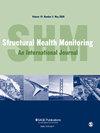一种改进的经验傅里叶分解轴承故障诊断方法
IF 5.7
2区 工程技术
Q1 ENGINEERING, MULTIDISCIPLINARY
Structural Health Monitoring-An International Journal
Pub Date : 2023-06-16
DOI:10.1177/14759217231178653
引用次数: 0
摘要
针对轴承故障信号由于结构复杂、传输路径复杂而受到强背景干扰,影响准确提取故障特征的问题,提出了一种增强的经验傅里叶分解技术。首先,为了减弱传输路径的影响,预先采用了基于趋势线提取的方法,抑制了信号失真和背景噪声干扰;然后,为了获得适合经验傅里叶分解的参数,构造了基于相关系数的分解数选择方法,以避免不相关模态函数的存在;为了减少分解过程中带宽过窄的无效频带,提出了频带改进策略,以加权谐波显著性指数为目标,确定了最优模态分量。最后,采用快速傅里叶变换,准确检测出轴承故障特征。采用仿真和实验方法对轴承故障信号进行分析;分析结果表明,该方法能够有效地从强背景干扰中提取滚动轴承的故障特征。本文章由计算机程序翻译,如有差异,请以英文原文为准。
An enhanced empirical Fourier decomposition method for bearing fault diagnosis
To address the problem that bearing fault signals are usually contaminated by strong background interference due to multiple structures and complex transmission paths, which affects accurate fault feature extraction, an enhanced empirical Fourier decomposition technique was proposed in this paper. First, in order to weaken the influence of transmission path, the trend-line-extraction-based method was utilized in advance, which suppressed the signal distortion and background noise interference. Then, to achieve the appropriate parameter for the empirical Fourier decomposition, the correlation-coefficient-based decomposition number selection approach was constructed to avoid the existence of irrelevant modal functions. The band improvement strategy was proposed to reduce the invalid frequency bands with too narrow bandwidth during the decomposition process, the weighted harmonics significant index was utilized as the target, and the optimal modal components were also determined. Last, the fast Fourier transform was employed, and the bearing fault signatures were accurately detected. The simulation and experimental bearing fault signals were used for analysis; with the help of some comparisons, the analyzed results show that this method can effectively extract the fault characteristics of rolling element bearing from strong background interference.
求助全文
通过发布文献求助,成功后即可免费获取论文全文。
去求助
来源期刊
CiteScore
12.80
自引率
12.10%
发文量
181
审稿时长
4.8 months
期刊介绍:
Structural Health Monitoring is an international peer reviewed journal that publishes the highest quality original research that contain theoretical, analytical, and experimental investigations that advance the body of knowledge and its application in the discipline of structural health monitoring.

 求助内容:
求助内容: 应助结果提醒方式:
应助结果提醒方式:


